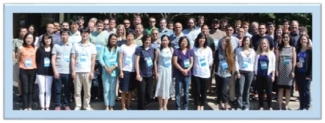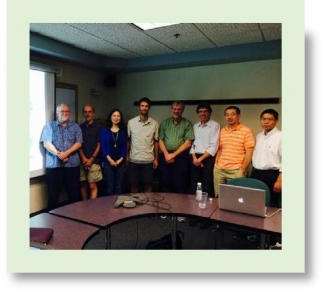The DTC hosted the 5th Community Gridpoint Statistical Interpolation (GSI) Tutorial on July 14-16 of this summer at the NCAR Foothills Laboratory in Boulder, Colorado. One of several outreach events sponsored recently by the DTC, this tutorial was held in collaboration with other major GSI development teams from around the United States. With an ultimate goal of providing operational capabilities to the research community, this series of tutorials has become a primary training resource whereby both operational and research users can gain knowledge essential to running and further developing GSI.
The tutorial this year was a three-day venture that included both invited lectures and practical hands-on sessions relevant to GSI. Within the program were lectures designed to cover both fundamental (e.g., compilation, execution, and di agnos t i c s ) and advanced (pre-processing, radiance and radar data assimilation, hybrid techniques, and GSI infrastructure) topics.
Lecturers and practical session instructors were invited from major GSI development/support teams, including NCEP/EMC, NASA/GMAO, NOAA/ESRL, and NCAR/MMM, along with DTC members from NOAA/ESRL and NCAR/ RAL. The principal guest speaker from the university community this year was Dr. Milija Zupanski from Colorado State University. Attended by 41 students from the U. S. and other international agencies and universities, the tutorial easily reached maximum capacity.
Tutorial presentations and lectures are posted at http:// www.dtcenter.org/com-GSI/users/docs/index.php. For more information about the GSI system itself and its community support, please visit: http://www.dtcenter. org/com-GSI/users/index.php.
On July 17 after the Community Gridpoint Statistical Interpolation (GSI) Community Tutorial (summarized on page 4), the GSI Review Committee also met at the NCAR Foothills Laboratory in Boulder. Established in 2010, this committee continues to coordinate GSI development from both operational and research communities, and is also responsible for reviewing and approving GSI code updates. During general review of ongoing GSI development efforts and future plans for GSI, the committee specifically discussed potential community support of the NOAA Ensemble Kalman Filter (EnKF) system, which is currently a part of the GSI-based hybrid ensemble variational system of the NOAA Global Forecast System (GFS), and a potential candidate for other operational applications. The decision was then made to establish code management for this EnKF system that follows the existing GSI code management protocol. As a consequence, the GSI review committee effectively becomes a joint review committee for both GSI and EnKF, and new membership (NOAA/ESRL, and the University of Maryland as a deputy member) was approved to represent the EnKF development effort. This new DA review committee thus includes members from NCEP/ EMC, NOAA/ESRL, NASA/GMAO, NESDIS, AFWA, NCAR, the University of Maryland, and the DTC.


